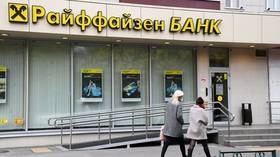
Continued exposure to the sanctioned country poses a reputational risk, the European Central Bank’s chief supervisor has claimed

© Sputnik / Ilya Pitalev
Eurozone banks should lower their exposure to Russia or divest from the country altogether, European Central Bank (ECB) chief supervisor Andrea Enria said during a press briefing on Tuesday.
According to the official, lenders are risking their reputations if they continue to work in the sanctioned state.
“I think that it is important that banks remain very focused on reducing further their exposures and, ideally, exiting the market as soon as they can,” Enria stated, as cited by Reuters.
“This is a process that we not only praise, but we strongly pressurize banks to perform because there is a huge reputational risk in continuing to operate in Russia,” he added.
Enria acknowledged that Russian branches of Eurozone banks have limited their operations, and for example are no longer granting new loans. He also admitted that the process of divesting from Russia has become increasingly difficult due to new legislation which includes a requirement for presidential approval.
A number of foreign banks have left Russia over the past year amid Western sanctions which followed the start of Moscow’s military operation in Ukraine. However, several lenders, including some from the Eurozone, continue to operate in the country. These include Raiffeisenbank and UniCredit Bank, which are subsidiaries of Austria’s Raiffeisen Bank International (RBI) and Italy’s UniCredit. Both play a crucial role in the Russian economy, enabling euro payments to and from the country. They are also the only foreign entities on the Russian central bank’s list of 13 systemically important credit institutions.
READ MORE: Leading US bank makes deal with sanctioned Russian lender
Raiffeisen announced in April that it was considering selling its business in Russia, but warned that it would suffer significant losses if it decided to divest from the country. The bank’s Supervisory Board chairman, Erwin Hameseder, at the time accused “morally arrogant” critics of the firm’s continued work in Russia of “black and white moral thinking.” He insisted that most Western businesses continue to work in the country despite sanctions and geopolitical crises.
For more stories on economy & finance visit RT’s business section




